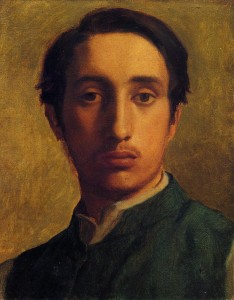E
dgar Degas is one of the most esteemed painters in history. Known for his masterly ability to depict movement in his paintings, he is regarded as one of the founders of impressionism.
It didn’t happen easily though, he worked for it. Degas had a natural flair for art, which he pursued throughout his childhood. Upon turning 18, his father wished him to become a lawyer and Degas soon found himself in law school at the University of Paris. Of course this hardly discouraged him. He paid his studies no mind, and was still focused on his art, aspiring to be a historical painter.
A few years later, he met his hero and inspiration in Jean-Auguste-Dominique Ingres, who encouraged him to follow his passion.
Draw lines, young man, and still more lines, both from life and from memory, and you will become a good artist.Jean-Auguste-Dominique Ingres
As motivated as ever, Degas followed this advice and continued mastering his abilities in the arts. In his late thirties, he pivoted into a more contemporary style, which bridged the gap between the traditional and the modern. The rest is history.
What is often forgotten when we speak of Degas is that he also had a love for poetry during his career. In fact, he had aspirations to become a poet himself.
A story shared by Paul Valéry details a conversation between Degas and his good friend and poet Stéphane Mallarmé about his struggles with poetry. Degas acknowledges that his writing isn’t great and says, “But I’ve got lots of ideas-too many ideas.”
Mallarmé responds, “But my dear Degas, poems are not made out of ideas. They’re made out of words.”
And this is the point. Degas painted and became a master painter. He worked at it. When it comes to poetry, he didn’t have that same drive. He had ideas, but not words. Ideas alone are a terrible investment.
This is what I mean when I say you need to become a professional at what you do. You need to take it seriously and work for it and struggle to get better. Degas was a professional at painting. He was an amateur at poetry. The distinction is stark. This isn’t to say he couldn’t have become a professional at both, but he clearly didn’t have the desire to do so.
You need to be a professional and doing so means you understand these 5 things.
1. Professionals know ideas are not enough.
As Degas, everyone has ideas. Ideas are easy. You just sit around having a drink or a coffee and can come up with hundreds of ideas. Not to say anything about quality, but ideas are floating around all about us, waiting for us to snatch them up.
What is hard is making those ideas work. Turning them into something real. Ideas alone are not enough.
2. Professionals know that talk is cheap.
I’m guilty of this as anyone else, but nothing comes from talking about what you’re going to do. Talk is just that. It’s empty words and masks you wear to hide from reality. If you talk too much, odds are you’re not doing the real work behind the scenes.
As Henry Ford said, “You can’t build a reputation on what you’re going to do.” Do the work and stop talking about it.
3. Professionals know that work starts out bad.
When you start working on anything, in the beginning it’s crap. There’s no way around it. Your work starts out bad, but as you continue working on it, it gets better and closer and closer to what you envisioned.
This is true for one-off projects, as well as mastering any skill, similar to how Ira Glass describes the gap between ability and taste. It takes time to make good work.
4. Professionals know there are no guarantees.
Being a professional doesn’t make you any promises. Just because you put in the blood, sweat, and tears, you have to realize it just may not work out. That’s the nature of the commitment.
While I believe if you really want it, you’ll get there eventually, but most of us give up far before that threshold is ever met. Having the understanding that it may never come, is a sign of a true professional. They may not become a huge success, but they do it for the process, for the work in and of itself, and nothing more.
5. Professionals know there is no end.
It never ends for a professional. 10,000 hours or 100,000 hours, there’s no finish line when you make this commitment. Becoming a master is one thing, but it’s not like you give up on your work after that.
The professional is in it for the long haul, constantly perfecting their craft and honing their skills.
Being a professional is doing the things you love to do even on the days you don’t feel like doing them.Julius Erving
You can do anything, if you actually put in the work, if you commit to being a professional. It’s possible, but it’s not easy.
So when you sit down to do your work, give yourself a pat on the back. You’re facing the struggle, you’re battling the resistance, you’re fighting the good fight. But don’t puff yourself up too much, after all, there’s work to be done.
Image via flickr
